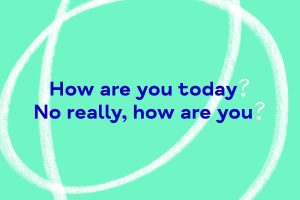Emma Yates Badley’s Story – RED January, Exercise and OCD.
14/02/2019

I am not the owner of a perfect swishy pony tail, my face turns beetroot, I sweat, and I only like kale cooked in a load of butter, but I’m a runner.
I used to view exercise as a punishment (a hangover, perhaps, from uninspiring PE lessons at school) and long-distance running was my least favourite activity. Then, in 2016, I was diagnosed with Obsessive-compulsive disorder (OCD) and I began to embrace the benefits of exercise.
When you think about OCD, you might conjure up images of a neat freak or someone who washes their hands multiple times in a row, and while it’s true that some sufferers do carry out these rituals, it’s not what defines OCD. Just like with any other mental or physical health issue, everyone experiences OCD differently. I’d spent years hiding my compulsions and obsessions because I didn’t understand what they were and, at one point, had become so terrified of my own mind that I barely left the house. My intrusive thoughts and ‘doubts’ revolve around electrical objects, fire, safety and illness.
There have been times where I’ve been so far entrenched in my illness that my brain has tricked me into thinking I’ve done things that I would never ever do. But that’s the cruel thing about OCD, it uses our deepest fears and anxieties against us. The brain is a sophisticated bit of kit and when faced with adversity, it finds its own way to cope. Outwardly, I appeared functional, but my thought patterns became disordered and my brain started thinking up ways of keeping me, and those I love, safe. I over-checked locked doors, put candles outside even if I’d never lit them, took photographs on my mobile phone of the stove and plug sockets to reassure myself that I’d switched these things off.
The lowest point came when I fixated on eating and became convinced that solid food would cause me to choke. I would shake involuntarily, and I was left in a constant state of anxiety with my heart beating far too fast. For a long time, I wrongly thought that I was just sensitive (years of being told this made me believe it must be true) but through therapy I’ve realised that it all stems from personal trauma and a feeling of having little control.
Exercise was my saviour. It began with short walks to increase my strength and then I began to practice yoga which helped centre me when I felt off-balance. Routine helped as it was something tangible I could regulate and the first time I left the house unaided in months was to go for a run. I didn’t go far but something in me began to shift. Exercise in conjunction with talking therapy helped me see that my intrusive thoughts were just that, thoughts, and – although it seems impossible at time – like waves they crescendo and then pass.
Anyone can be active. There’s a myth in our society about what ‘healthy’ looks like. In my mind, a ‘runner’ – or any active person – was lean with a swishy high ponytail and the stamina of Usain Bolt. They probably also drank kale smoothies, wore a Fitbit and marked distance in kilometres. In my comparison-riddled mind, runners possessed almost supernatural breathing abilities, able to run for miles where I could barely run to catch the train without getting a stitch.
I am not the owner of a perfect swishy pony tail, my face turns beetroot, I sweat, and I only like kale cooked in a load of butter, but I’m a runner. I don’t have fancy running gear (prior to last month, I stashed my key and phone in my sports bra as I didn’t have a sports jacket with zipped pockets) and run in old t-shirts. But that’s what I love about RED January 2019, the community initiative that encourages people to support their mental health by doing something active every single day. There’s no app to monitor distance or time (let’s face it, giving someone with obsessive-compulsive tendencies a way to compare themselves with others is just asking for trouble) or target you’re urged to hit. It’s simply about getting out into the world, moving your body and feeling something else.
Research suggests that running has a positive impact on mental health, helping to make people more confident, motivated and improves body image but, for me, it’s not about mastering a sport or being as good as someone else, but finding my own groove and routine. There are days when I go running and simply feel OK. I don’t feel amazing. I’m not a-glow with health and endorphins aren’t a magic elixir for all my troubles but I do feel less fuzzy around the edges.
The mental clarity running brings me is invaluable in helping me navigate living with a mental health issue and most days I can’t wait to strap on my running shoes and head outside.
Emma Yates Badley writes for Northern Soul. You can read her blog on the site here.
